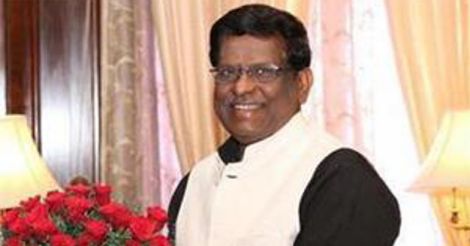Meghalaya governor V. Shanmuganathan has resigned following allegations that he had turned the Raj Bhavan at Shillong into a “ladies club".
In an unusual move, 80 Raj Bhavan employees had complained to president Pranab Mukherjee and prime minister Narendra Modi that the governor, in his late sixties, had taken unusual interest in recruitment of lady employees, and groups of women had free access to the Raj Bhavan.
Read also: Facing sexual charges, Meghalaya governor Shanmuganathan resigns
A woman had also accused that the governor, who comes from a disciplined background in the Sangh Parivar, of sexual misconduct. The governor denied the charges, accusing his enemies of cooking up a bundle of untruths and said he was resigning on health grounds.
He is the second governor in recent history to resign on such charges; the first being Congress veteran Narayan Dutt Tiwari, who had been accused during Manmohan Singh regime, of turning the Hyderabad Raj Bhavan into an open house for his lady friends. A widower at that time, Tiwari was asked to quit as the governor of undivided Andhra Pradesh. Before occupying the sprawling building, his successor had the place fumigated and had the beds and sheets replaced.
Ever since the Constitution invented the governor's job, some appointees have been involved in controversies, and have resigned. Many have been sacked for political reasons whenever there was a change of government at the center. But there have been other reasons too.
Sheela Kaul had to resign as governor after the CBI sought president's permission to file a chargesheet under the prevention of corruption act.
The tough chief election commissioner T.N. Seshan had forced out Himachal Pradesh governor Gulsher Ahmed after being the head of the hill state for just five months, because the Madhya Pradesh politician could not resist going to his home state and campaigning for his son.
Puducherry lieutenant governor Iqbal Singh, a Congress stalwart from Punjab, was forced to resign during the UPA regime as the enforcement directorate investigated allegations of money laundering. Singh protested his innocence.
Thirty governors and three lieutenant governors to head the states and union territories are appointed by the president on the advice of the prime minister. Though their term is for five years, the president can remove them again on the advice of the prime minister.
While the Constitution uses the word "pleasure" to indicate the government's confidence, Mukherjee has ordered that the word should not be used in communications of Rashtrapati Bhavan, as it has a double meaning.
Under the rules of business of the government, it is the home ministry, which supervises the governors, as part of its job of maintaining center-state relations. The governors send periodic reports to the president, but these are processed by the home ministry and important facts are brought to the notice of the home minister and prime minister.
The only president who kept governors under leash was R. Venkataraman, whose five-year term saw four prime ministers. The taskmaster he was, the president was shocked to find the governors were spending a lot of time away from their home states. He issued an order that a governor should take the president's permission before leaving his state, after explaining why he had to travel. The tour programs came down drastically.
However, Karnataka governor P. Venkatasubbaiah found a loophole. He interpreted the president's order to mean that the governor should not spend the night outside his state without the permission of Rashtrapati Bhavan. So, he would travel to his hometown, which was just a three-hour drive from Bangalore, in the morning and return to the Raj Bhavan before midnight. The sufferers were the officials in the border district of Karnataka, as they had to keep receiving and seeing off the governor.
Venkatraman's successor Shankar Dayal Sharma was very liberal, as he was a governor himself. He canceled the prior permission order and even encouraged governors to visit him at Rashtrapati Bhavan.
Like the president, governors enjoy considerable discretion in running the establishment in Raj Bhavans, and when they have a good equation with the chief minister, their wishes are fulfilled. The sprawling Raj Bhavans - some states like Maharashtra, Jammu and Kashmir, West Bengal have more than one residence of the governor - see a lot of casual appointments.
Home ministers, who use the intelligence bureau to monitor the political activity of the governors, otherwise do not question them.
But most governors, who are appointed in the last stages of their political or bureaucratic or military career, are careful about how they run the show. but the ones like Shanmuganathan invite controversy and pay the price too.

























